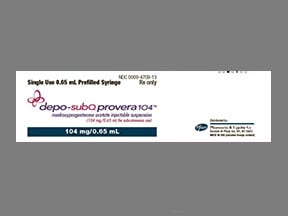Depo-subq Provera 104 is a limited distribution medication.

Depo-subq Provera 104 Coupons & Savings Card – Discount Prices from $35.64
My prescription
Edit
0.65ML of 104MG/0.65ML, Depo-subq Provera 104 (1 Syringe)
Select pharmacy

CVS
$79.63
COUPON PRICE
Walmart
$35.64
COUPON PRICE
Walgreens
$46.63
COUPON PRICE
Albertsons
$54.95
COUPON PRICEDepo-subq Provera 104 savings card
Show this card to your pharmacist
Walmart
$35.64
BIN
ID
PCN
GRP
019876
LH4C7344A4
CHIPPO
LHX
Powered by
More prescriptions for renal cancer
More prescriptions for renal cancer
Price history for Depo-subq Provera 104
1 Syringe, 0.65ML of 104MG/0.65ML
Average retail price for Depo-subq Provera 104
Average SaveHealth price for Depo-subq Provera 104
Our price history data is based on aggregated prescription data collected from participating pharmacies in America. Our prescription data updates daily to reflect the latest price changes. If you notice a missing data point, it means there wasn't sufficient data available to generate a monetary value for that date.
*Retail prices are based on pharmacy claims data, and may not be accurate when we don't have enough claims.
Depo-subq Provera 104 dosage forms
Dosage Quantity Price from Per unit 0.65ML of 104MG/0.65ML 1 Syringe $35.64 $35.64 0.65ML of 104MG/0.65ML 2 Syringes $90.28 $45.14 0.65ML of 104MG/0.65ML 3 Syringes $144.91 $48.30
| Dosage | Quantity | Price from | Per unit |
|---|---|---|---|
| 0.65ML of 104MG/0.65ML | 1 Syringe | $35.64 | $35.64 |
| 0.65ML of 104MG/0.65ML | 2 Syringes | $90.28 | $45.14 |
| 0.65ML of 104MG/0.65ML | 3 Syringes | $144.91 | $48.30 |
What is depo-subQ provera 104 used for?
Depo-subQ Provera 104 is used as a form of birth control to prevent pregnancy. It is also sometimes used to manage pain associated with endometriosis.
Can depo-subQ provera 104 cause weight gain?
Yes, depo-subQ provera 104 can cause weight gain as a potential side effect. Some individuals may experience an increase in appetite or changes in metabolism, which can contribute to weight gain while using this medication. It is important to discuss any concerns with a healthcare provider.
How much is depo-subQ provera 104?
The cost of Depo-subQ Provera 104 can vary depending on factors such as location, pharmacy, and insurance coverage. It is recommended to check with local pharmacies for the most accurate pricing or consult with an insurance provider to understand coverage details.
How much does Depo cost out of pocket?
The out-of-pocket cost for the Depo-Provera shot can vary depending on the pharmacy, location, and whether any discounts or coupons are applied. On average, the cost can range from $50 to $150 per injection. It's advisable to check with local pharmacies or healthcare providers for the most accurate pricing.
What are the side effects of depo-subQ provera 104?
Depo-subQ Provera 104, a form of birth control, may cause several side effects. Common side effects include changes in menstrual periods, weight gain, headache, nervousness, abdominal pain, dizziness, and decreased libido. Some individuals may also experience injection site reactions, such as pain or swelling. Less common but more serious side effects can include bone density loss, allergic reactions, and mood changes. It is important for individuals to discuss any concerns or side effects with their healthcare provider.
